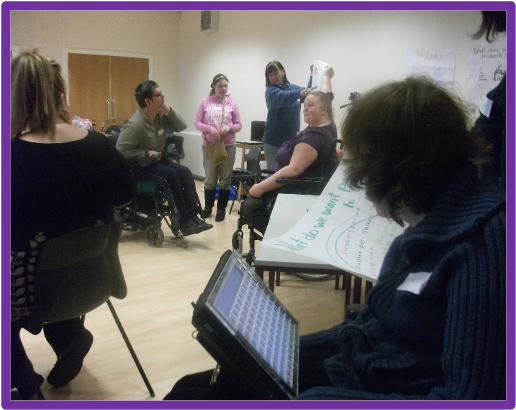Widening the Impact of Co-design Research
Published: 3 February 2021
In Sept 2020 a team at UWS hosted a series of sessions on Co-designing Research: Widening Impact through Critical Materialist and Posthumanist approaches. The event was designed by the interdisciplinary team at UWS drawn from Arts, Humanities and Social Sciences. Practitioners and researchers, ranging from urban geographers to performers, sociologists to visual artists are extending the participation relationships to all aspects of the research process.
Spring into Methods Workshop at UWS

Figure 1. Working Together in Adult Support and Production Workshop, photo by Beth Cross
In September 2020, a team at the University of the West of Scotland (UWS) hosted a series of sessions on 'Co-designing Research: Widening Impact through Critical Materialist and Posthumanist approaches'. The event was designed by the interdisciplinary team at UWS drawn from Arts, Humanities and Social Sciences. Practitioners and researchers, ranging from urban geographers to performers, sociologists to visual artists are extending the participation relationships to all aspects of the research process. Increasingly, organisations and communities are gaining confidence and skills working as partners in research. These deeper, more extensive relationships require reassessment of how power is shared, distributed and disrupted, paving the way for evolved models of system change. Developing on successful participatory training in the past two years, the training offered those working with more immersive, sensory and embodied methods an opportunity to examine the skills, knowledge and sensitivities that extending relationships with research partners to co-design require. Sessions focussed on developing co-produced research briefs and methods, blending praxis with creative input to make research accessible and enjoyable. A range of co-production strategies, from community safety, health and wellbeing to cultural heritage-related projects were used to explore challenges of researching with marginalized groups. The interactive workshop culminated in a panel discussion examining the importance of research ethics when undertaking co-produced research. Through critical materialist and posthumanist perspectives, participants were invited to consider the relational materiality that participatory methodologies enable.
The Evolving Context of Co-design
Co-design is the practice of supporting the active involvement and participation of ‘users’ (people/stakeholders/those impacted by the design) in the design of research and all aspects of research that flow from designing together in order to co-produce research learning, outcomes and impact.
To understand the context of co-design research, you may find it interesting to look at an overview of co-production's growing importance globally in this European Conference on Education Research (ECER) keynote speech by Ramon Flecha. Closer to home, a report from the Scottish Improvement Science Collaborating Centre explores health and social service providers working in co-production across Scotland and the policy interface that may form the context for your own research here in Scotland. Finally, this reflective article reflects on the power dynamics of implementing a co-production approach over unequal policy terrain.
Resources from Workshops
See the table below for links to the discussions throughout the programme. Those participating in the programme exchanged a rich range of examples which can be accessed on the programme’s VLE. You can access this by registering for Open UWS and enrolling into 'Co-designing Research: Widening the Impact'. We used this framework of Codesign Principles to examine cases developed by David McGillivray provides guidance on thinking principles through into practice. The range of examples and the questions this raises are introduced in this presentation by Beth Cross and Sandro Carnicelli.
Posthuman Contributions to the Co-design Conversation
Posthuman perspectives enlarge and trouble the interactants which we consider to be co-producing together. There are differing strands of posthumanism which focus attention beyond the human in differing directions such as inquiries into how technical and artificial intelligence in particular interact and are entangled with the human, or inquiries that decentre the human in relation to our environment and our cohabitants on this planet. Laura Farlone surveys this expanding terrain in her article on Posthumanism and Design. Common is the endeavour to reimagine systems and our place within them. Research as already acting in the world blurs conventional boundaries across disciplines and dissolves the binary distinctions between observed / observing, researched / researching, passive / agentive. For those seeking different kind of relationships within which to generate knowledge, posthuman offers differing points to enter into conversation. The logic of posthumanism also inserts a sense of urgency. As Candace R Kuby, Karen Spector and Jaye Johnson Thiel, challenge in their edited collection on Posthuman literacies, Posthumanism and Literacy Education: Knowing/Becoming/Doing Literacies, there is no alibi: we can never claim to be elsewhere; we are already always implicated.
What does it matter, if we think/speak/act as humans not defined as the discrete neo-liberal rational subjects but as interactants entangled within and around other bodies with whom we share the agency and potential of every moment?
Barad offers some important conceptual purchase for anyone attempting to respond to this question. She argues our research interactions are better conceptualised as diffractive than reflective. That is, to understand our task as discerning patterns of on-going interactions rather than as inspection of discrete images that can be mirrored back to us.
She suggests that we are always in the midst of performance, not as mere display or projection, but in the midst of being formed and forming in mutually constitutive activity with differing modes of agency in play. These conceptions together raise awareness of the entanglements that we can become sensitised to. Posthumanism is a way of seeing and intra-acting that is challenging to make accessible. And yet, it opens up a reconsideration of embodied and embedded knowledge of lived experience and challenges us to reconsider the margins beyond traditional academic preserves. Carol Taylor offers a more in depth consideration of the implications for educational research in this chapter.
This article was provided by by Dr Beth Cross, Co-coordinator of UWS Professional Doctorate.
First published: 3 February 2021
<< News

